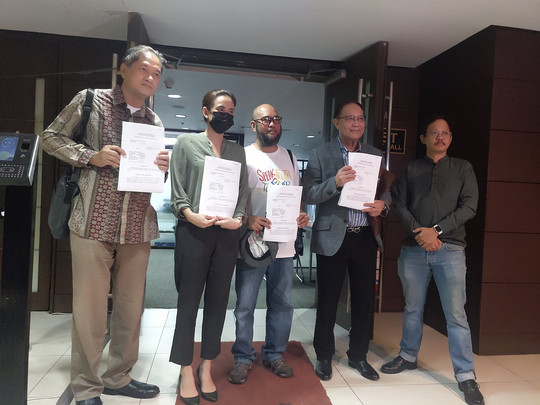It was inevitable, really, but still a shock when it finally happened: Earlier this week — on World Press Freedom Day of all days — I was accused by name on a government propaganda show of being in a communist front organization and of “being active in underground operations” of the Communist Party of the Philippines and New People’s Army.
It is true that I joined protests leading to Joseph Estrada’s ouster in 2001 as was my right to do and one that I exercised openly. What, after all, is the point of a protest that nobody sees?
That is not even a crime, but even if it was, then I would certainly be among the least guilty.
I am not, for the record, a member of the CPP or the NPA, nor have I ever been.
I am, though, a proud member of the National Union of Journalists of the Philippines, a registered organization that is an affiliate of the International Federation of Journalists.
We have been active in documenting threats and attacks on media workers, helping journalists get basic safety training as well as training in planning coverage in hostile or unsafe areas, and assisting colleagues facing legal problems.
Because we were organized as a union of media unions, we continue working to inform colleagues of their economic and labor rights and have been encouraging organizing in the workplace.
We have also been consistent with speaking out against red-tagging — the dangerous practice by the government and its proxies of labeling dissent, critical reporting, and organizing as a threat to the very existence of the Philippines and civilization in general.
We do this because many of our colleagues have been red-tagged, which puts them in danger of surveillance, harassment and arrest.
At the very least, the anxiety and worry that being red-tagged brings contributes to the chilling of media in the Philippines.
Our campaigns are premised on freedom of the press, expression and of association, which are all in the Constitution, and we have never made statements beyond that.
They’re red-tagging entire newsrooms now
Also red-tagged on the same show were Philstar.com — the newsroom where I work as news editor — and Rappler, which was described as having been infiltrated by communists.
I cannot speak for Rappler — in any case, they have their own staff and a huge community to do that for them — but can say with confidence that our reporting is anchored on fundamental freedoms and on human rights, concepts that should not even be controversial much less revolutionary.
It is ironic that our shift to reporting with a human rights lens began because of the “war on drugs” and the notorious narco-lists that the president used to read live on national TV.
In that list is the liar and red-tagger Jeffrey Celis, who now claims to be a former NPA and who maligns people to justify his continued but discredited role as an informant and mouthpiece.
We believed then as we do now that accusation is not proof and that conviction depends on evidence.
We believed then as we do now that people have the right to speak out, to seek redress and to organize without being reflexively labelled as troublemakers and enemies of the state.
We believed then as we do now that people should be protected from surveillance and illegal searches, unfounded accusations, and arbitrary arrests.
We believe these as much as any government official and employee claims to do when they take their oath of office and promise to preserve and defend the Constitution.
I believe that our newsroom will continue believing these things because our editors and reporters cannot do otherwise. This is what we have been taught since elementary school and through, for those who had the privilege of attending, journalism school.
I am proud of the journalism that we have produced and it is unfortunate that being red-tagged is the price of giving primacy to underreported sectors and the groups that represent them.
I say this now because there is a possibility, however remote, that I might lose my job over these accusations — as we have constantly reminded people, red-tagging has real world consequences and loss of livelihood is just the least dangerous of those.
I take comfort in the support that I have received in recent days and solace in knowing that there are others, so many others, in our newsroom and in others, who will keep this going.
As colleagues said at the Press Freedom Fair on Friday, the community of independent journalists is never writing 30.
Jonathan de Santos is the chairperson of the National Union of Journalists of the Philippines (NUJP) and news section head at Philstar.com.

